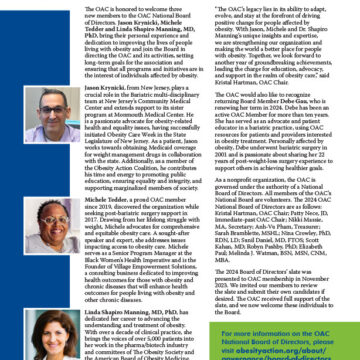Mental Health Corner: The Impact of Family Weight Bias on Health


by Robyn Pashby, PhD
Winter 2024
“No one is ever going to date you if you don’t lose weight.”
“Would you be willing to lose weight if we paid you $1,000?”
Writing these quotes is challenging, but it’s even more difficult to imagine that they were said by a parent to a child.
The unfortunate truth is that these are real comments (de-identified and slightly altered to protect privacy) that my patients have endured from their family members. It’s easy to understand why comments like these hurt a child or teen’s feelings, but they do much more than that. These types of comments are examples of outright weight bias and shaming and can trigger a variety of serious mental and physical health problems.
Even when weight bias is not quite as overt as in the examples referenced above, it is still detrimental. Subtle comments, looks or judgments can stay with people for years. For instance, an adult woman recalled a memory of her middle school years when she went back-to-school shopping with her mother one early September afternoon. In dressing room after dressing room, her mother refused to buy her clothes that had a fitted style, despite them being in fashion and the girl feeling her best in them. Instead, her mom encouraged her to purchase flowy, non-form-fitting clothes that would help ‘hide her problem areas.’ This woman had never communicated to her mother how this experience affected her, yet she found herself reflecting on it more than 30 years later every time she went clothes shopping.
Others have shared their childhood experiences of being closely monitored by their parents regarding their dietary choices. Some have described how such ‘food policing’ taught them to engage in sneaking food at very young ages (eight or nine years old). Learning to hide Halloween candy under the bed and consuming as much junk food at a friend’s house as possible during a playdate can happen as early as pre-adolescence. For some, this behavior of sneaking food became a precursor to more disordered eating behaviors, such as binge eating, and/or contributed to increased shame associated with eating throughout the teenage and adult years that followed.
Still, others describe how their parents’ own relationship with food and their bodies was problematic. A parent who repeatedly dieted or expressed dissatisfaction with their own body rarely goes unnoticed. One adult client shared how observing her mom avoid being in family photos, never don a bathing suit at the pool, and verbally express disgust when looking in the mirror at herself had made her question her own body shape and size for decades. Despite never having had obesity, she struggled with very poor body image, low self-esteem, and disordered eating patterns for much of her adult life. As she worked on healing from her difficult relationship with her body and food, she slowly realized how much she had been affected by watching her mom’s internalized weight bias. She had learned, without ever being directly taught, that the pursuit of an idealized body shape or weight was of utmost importance. She had learned that living with obesity was something to hide, not to be seen. She had also developed her own unrealistic body image expectations, a sense of inadequacy, and low self-esteem, which she believed traced back to watching her family struggle.
This example is not unique. In many cases, parents have had their own struggles and have experienced helplessness and concern about their health and weight. Sometimes, without meaning to, they pass on their biases about weight to their kids. It’s not because they’re bad parents, but because they might not realize it. Parents might worry about their kids’ health and want to help, but they might not understand that obesity is a complicated medical condition. Instead, they might think that everyone just needs to be more motivated, have more self-control, and eat less and exercise more. These mistaken beliefs can lead to parents trying to push their kids with tough love, orders or making them feel ashamed.
Unfortunately, weight bias and stigma have real and long-lasting effects. Physically, experiences of weight bias can contribute to increased cortisol reactivity, insulin resistance, and weight gain.
Psychologically, common outcomes include depression, anxiety, low self-esteem, poor body image, and increased stress. Behaviorally, individuals exposed to bias often report avoidance of healthcare, avoidance of exercise, and increases in binge or emotional eating. This damage is particularly critical when the bias is perpetrated, whether intentionally or unintentionally, by the people who are supposed to provide the unconditional love and safety that we expect but don’t always receive from family. To be blunt, weight bias can be a source of traumatic stress.
The Substance Abuse and Mental Health Services Administration (SAMHSA) is the agency within the U.S. Department of Health and Human Services that leads public health efforts to advance the behavioral health of the nation. SAMHSA defines trauma as “an event or series of events, or set of circumstances that is experienced by an individual as physically or emotionally harmful or threatening and that has lasting adverse effects on the individual’s functioning and physical, social, emotional, or spiritual well-being.” Many experiences of weight bias certainly fit within the scope of that definition. Therefore, it is important to consider the impact of words and actions and their role in perpetuating a cycle of traumatic stress through weight bias. Instead of continuing to pass down a cycle of weight bias and stigma, you can learn to break the cycle.
Steps to Reducing Weight Bias
Start with self-reflection
Examine your own attitudes and biases about weight, size, and appearance. Recognize any biases you may hold and be willing to challenge and change them, both for yourself and for your family.
Make space for open communication
Encourage open and honest communication within the family, ideally starting at an early age, but it is never too late to change. Create safe spaces where family members can discuss their feelings and concerns without judgment.
Educate yourself
Learn about the harmful effects of weight bias, both on individuals and on family dynamics. Learn about the complexity of weight and weight loss to move away from an “eat less, move more” philosophy.
Emphasize and embrace individuality
Highlight the uniqueness and individuality of each family member, emphasizing that people come in different shapes and sizes, and all are equally valuable and deserving of respect.
Focus on health
Work to understand that weight loss is not the same as obesity treatment. In other words, societal focus on weight loss has primarily been oriented towards appearance. However, if you or your family is struggling with health conditions related to obesity, or if living with obesity is negatively impacting your physical and/or mental health, then consider seeking appropriate treatment from trained professionals.
Encourage and practice self-compassion
Teach family members and remind yourself about the importance of self-compassion. Continue to pursue an understanding that self-worth is not determined by weight or appearance.
Address bullying and teasing
If you become aware of weight-related teasing or bullying within the family, no matter how small, address it promptly and emphasize the harmful impact it can have on a person’s self-esteem and well-being.
Seek professional support
If a family member is struggling with body image issues, disordered eating, or physical and/or emotional distress related to weight, consider seeking professional help from a therapist, counselor or physician who specializes in obesity care.
Conclusion
Unfortunately, a cycle of weight bias within families is often unintentionally perpetuated. However, fostering awareness, providing education, and making a concerted effort to challenge negative beliefs can help transform behaviors related to weight and body size. Parents, caregivers, and family members can collaboratively work toward replacing weight bias with a culture of acceptance, support, and comprehensive multidisciplinary care.
About the Author:
Robyn Pashby, PhD, is a clinical health psychologist who is deeply committed to the mission of the OAC. She has personal experience with obesity and comes from a family with a history of obesity. Over the past 15 years, Dr. Pashby has dedicated her work to integrating mental healthcare into obesity treatment. She has done this in various multidisciplinary settings and, most recently, through her own behavioral health group practice.
by Sarah Muntel, RD Spring 2024 Spring has sprung, bringing sunnier and warmer days! For many, this…
Read Articleby Michelle “Shelly” Vicari Winter 2024 Winter has arrived! Don’t allow the chilly and damp weather to…
Read Articleby Kendall Griffey, OAC Communications Coordinator Winter 2024 The Obesity Action Coalition’s 12th annual Your Weight Matters…
Read Article








